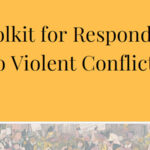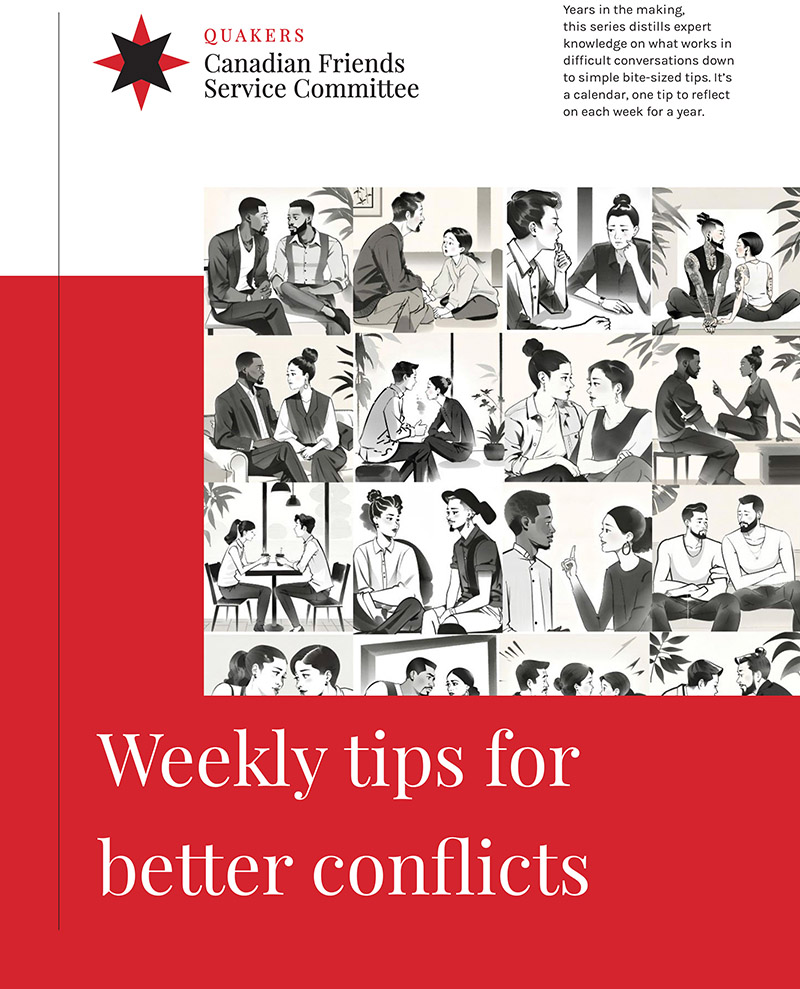
Toolkit for responding to violent conflicts
September 25, 2024Weekly tips for better conflicts—email sign up success!
October 2, 2024![]()
 Canadian Friends Service Committee (Quakers) is excited to offer a fresh video series of short tips for better conflicts!
Canadian Friends Service Committee (Quakers) is excited to offer a fresh video series of short tips for better conflicts!
Years in the making, this series distills expert knowledge on what works in difficult conversations down to simple bite-sized tips.
It’s a calendar, one tip to reflect on each week for a year. Sign up to get the tip right in your inbox!
Curious what you’ll discover in this series? The tips can be summarized as these four:
Four tips for more rewarding disagreements and conflicts
- Distinguish between the problem and the person. When something is wrong, name that problem, but don’t confuse that with being opposed to the other person or their feelings. To address the problem, try to engage with the other person as someone you care about and respect, not something to defeat, control, or persuade.
- Bring out everyone’s best. Conflicts are demanding. As much as possible, pick a place and time where everyone can be their best self—the one who’s most open to positive engagement on the issue.
- Listen slowly and generously to find feelings and needs. Keep slowing down and listening—interpreting generously and identifying the basic feelings and needs. Check with the person that you got these right.
- Simple and clear definition. Together with the other person, give definition to the story of what’s happening. Try to be simple and clear. Avoid being clever or making a broad analysis that includes too many problems.
But how do I take my skills to the next level?
Trouble with your neighbour? A difficult boss? A family member makes a cringey bigoted comment?
If you’re hungry for more details to really improve your skills for that tough conversation, sign up for your free weekly email.
You’ll find a breakdown of the above four tips into a calendar: 52 tips, one you can focus and reflect on each week for a year! At the end there’s a story showing how these tips could be used.
If you’re like most people, you’ll learn best through practice. Yes, you can read about how to swim, but really, you have to get in the water. Practice is what makes any new skill possible. Eventually it may even feel easy and natural.
This long list of 52 tips is for those who prefer detail and want to practice to take their conflict skills to the next level.
Each tip is carefully selected. They’re based on scientific evidence and advice from experienced people who’ve dedicated their lives to transforming bitter conflicts.
These tips are offered in the hope that some will be helpful to you, but they’re only suggestions. Nothing here is meant to be memorized or repeated robotically. There’s no “one right way” to be in conflict.
General information always needs to be adapted by the person using it. These tips can’t anticipate your particular situation. It’s up to you to decide when something feels right to try, or too dangerous, too emotionally demanding, and so on.
Want a sneak peak of the calendar? You can read all of the tips in PDF.
Need something more than just quick tips? How about a workshop for your community group or organization? We offer that too.
Why did we create this series of free tips for difficult conversations?
If Quakers are known for one thing, it’s their deep commitment to peace, pacifism, and social justice. This dates back centuries. There’s a reason that Quaker service agencies won the Nobel Peace Prize.
Canadian Friends Service Committee has more than 90 years of experience with Quaker peace and social justice work.
This is a rich and complex history. We’ve reflected deeply on peace for a very long time. We always have more to learn too. And Quakers, like everyone else, need simple reminders to help bring out our best selves, especially during conflicts.
Over the last 15 years we held multiple consultations with Quakers across Canada. We found out their priorities, hopes, and fears. We discovered what Friends believe about peace and what they’re doing at the grassroots.
We reached far beyond Quakers too. We listened to so many stories from folks from all sorts of backgrounds who are working for peace and social justice in countless different ways.
We also did a thorough review of academic evidence. We wanted to learn what different disciplines know about human behaviour and beliefs and how peace can spread.
While thinking and talking about it, we never stopped doing peace work. We’ve been continually learning and refining our knowledge about what’s possible, and our theories about how change happens for a more just and peaceful world.
We’ve developed a clear sense of what peace means to us. It’s informed by so many great ideas from academics and practitioners. It’s informed by successes in many different countries, by those doing the hard and courageous work of positively transforming all sorts of incredibly difficult conflicts.
All of this careful research and reflection—grounded in our values and history as Quakers—has led to not one but two books: The Four Elements of Peacebuilding: How to Protect Nonviolently, and Are We Done Fighting? Building Understanding in a World of Hate and Division.
We’ve now had countless conversations about peace and justice issues, facilitated lively workshops with hundreds of participants, done podcast interviews, given presentations, published an academic article, and written an ongoing blog for Psychology Today.
There’s so much inspiring and practical peace content in our books and interviews, on our blog, and in the free workshops we offer.
But we realize that many people who need to hear how conflicts are being transformed positively every single day—how justice is being achieved right now—aren’t going to read a whole book. They aren’t going to take part in a workshop series. And reading a short blog post is too easy to forget.
So we worked with a social media expert to develop a series of short videos for you!
This series is totally free.
It’s setup as a calendar, sharing one tip each week for a year.
This will give you a reminder, once a week, to spend just a few moments (most videos are under 1 minute long) reflecting on a particular peace skill. Many are simple, but powerful.
Follow us on social media or sign up by email to get a tip each week. You could watch the video, discuss it with a partner or friend, even experiment with the tip if the opportunity arises. See how it feels!
This series is here for you. It’s going to help you strengthen and spread your peace skills.
Let’s get started.
Get your free weekly tip for better quality conflicts
Important: A few minutes after you hit submit you’ll receive an email asking you to confirm. You have to click this link to be subscribed. If you haven’t seen the email in 15 minutes, check your spam folder.
Don’t want to sign up for another email list? These emails are short and only one per week, plus you can unsubscribe at any time, but OK. You can catch the tips on YouTube, Facebook, Instagram, or TikTok. Or you can read the full calendar in PDF.




